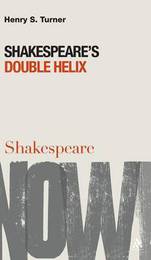
|
Shakespeare's Double Helix
Hardback
Main Details
| Title |
Shakespeare's Double Helix
|
| Authors and Contributors |
By (author) Henry S. Turner
|
| Series | Shakespeare Now! |
|---|
| Physical Properties |
| Format:Hardback | | Pages:144 | | Dimensions(mm): Height 198,Width 129 |
|
| Category/Genre | History of science |
|---|
| ISBN/Barcode |
9780826491190
|
| Classifications | Dewey:822.33 |
|---|
| Audience | | Postgraduate, Research & Scholarly | | General | |
|---|
|
Publishing Details |
| Publisher |
Bloomsbury Publishing PLC
|
| Imprint |
Continuum International Publishing Group Ltd.
|
| Publication Date |
20 December 2007 |
| Publication Country |
United Kingdom
|
Description
What does it mean to make life? This book focuses on one of the key questions for culture and science in both Shakespeare's time and our own. Shakespeare wrote A Midsummer Night's Dream during a period when the 'new science' had begun to unsettle the foundations of knowledge about the natural world. Through close analysis of the play and reflection on modern genetic engineering, Turner examines developments in early modern culture as it sought to come to terms with the new forces of magic, astrology, alchemy and mechanics, fields of knowledge that preoccupied the most adventurous intellects of Shakespeare's period and that promised limitless power over nature. Shakespeare's writing sheds light on current developments in science, ethics, law, and religion in contemporary culture. The book reveals the richness and peculiarity of early scientific thought in Shakespeare's time and shows how the questions he poses remain fundamental as the nature of 'life' has become one of the most pressing political, ethical, and philosophical problems for society today.
Author Biography
Henry S. Turner is Assistant Professor at Rutgers University, USA. He is the author of The English Renaissance Stage: Geometry, Poetics, and the Practical Spatial Arts (OUP, 2006).
ReviewsBriefly reviewed in the Year's work in English Studies journal, vol 89, No. 1 'The Shakespeare Now! series of 'minigraphs' aims to appeal to both Shakespeare specialists and the educated public by producing 100- to 140-page texts that purportedly reduce or eliminate arcane endnotes and scholarly jargon and that address timely topics- mainly post-modern ones- in readily understandable prose.' -- English Studies, Vol 91, No6. Mention in Today's Books/ Bookweek Reviewed by Peter J. Smith in Times Higher Education Supplement, 2008. "the conjoined pieces of Turner's book provide a fresh double reading of A Midsummer Night's dream. The book's imbricated left face/right face presentation makes every page mirror, echo or pre-empt themes from the opposite essay. In this year of Darwin's birth, the Globe Theatre's 2009 takes A Midsummer Night's dream on a national tour. Shakespeare Now! seems thus doubtly apt." Flux Magazine, 1 July 2009 -- Tim Huntley "...both an eye-catching attempt to assert Shakespearian contemporaneity and a genuine reflection of aspects of the volume's content...has a definite novelty value in the context of Shakespearian criticism, and it is raised above the merely gimmicky here by the highly apposite image that Turner finds for his title...a very readable, clear and informative quick overview of the development of modern genetic research...there is much interesting and stimulating comment in Turner's study, and the book itself ins undeniably memorable and thought-provoking." Oxford Journals Clippings: The Year's Work in English Studies, 2009 "The ambitious project of the Shakespeare NOW series is to bridge the gap between 'scholarly thinking and a public audience' and 'public audience and scholarly thinking'. Scholars are encouraged to write in a way accessible to a general readership and readers to rise to the challenge and not be afraid of new ideas and the adventure they offer. There are other bridges the series is ambitious to cross: 'formal, political or theoretical boundaries' - history and philosophy, theory, and performance." English Vol. 58, 2009 "In Turner's text past, present and the 'posthuman future' come together and Francis Bacon, Philip Sydney, and Bottom rub shoulders playfully with Richard Dawkins, Roland Barthes, and Puck." English Vol. 58, 2009
|